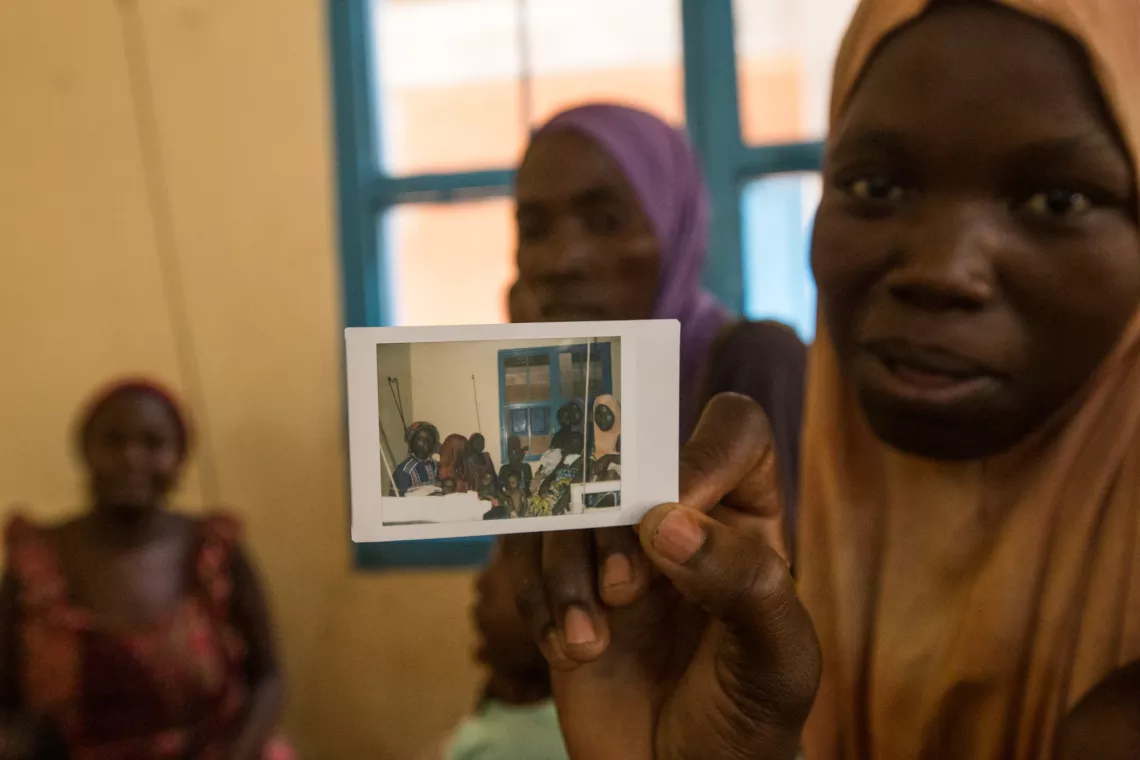Hope in the nutrition recovery room
In Niger more than 10% of children suffer from severe acute malnutrition.

Thanks to funding partners such as ECHO, USAID Food For Peace, the Governments of Canada and Spain, UKAID and Skala Foundation, UNICEF continues to support nationwide treatment for severe acute malnutrition.
The power is on and off inside the UNICEF-supported intensive nutritional recovery centre (CRENI) at Maradi´s Regional Hospital. The heat hits strong and families wait outside the treatment room for the improvement of the malnourished babies.
During the malnutrition peak, the number of severely malnourished children admitted in the intensive nutritional recovery centre in the Maradi Regional Hospital is multiplied by three putting a considerable pressure on health staff.
The CRENI´s room is overcrowded. There are only 22 beds for the 73 mothers who brought their babies for immediate treatment. Their children are severely malnourished. They all have very low weight and severe muscle wasting, and several have nutritional oedema characterized by swollen feet, face and limbs. They all have a story behind.

‘My name is Saratu, I am twenty-years-old. I had three children, but one died. I arrived here with my little child, Kabir, he is 13-month-old. He started losing appetite few days ago when he stopped eating. I was not sure what to do. I didn´t really know how to breastfeed properly so I brought him to the closest health center in our village, Tibirin, in Maradi region´ she explains.
‘Once we arrived to the health center, the nurses screened him and told me he has had serious health complications due to the lack of nutrients in his body. They weren´t able to assist him at the health center so we were referred directly to the regional hospital in Maradi. That day, I had to walk three kilometers with Kabir on my back until we reached the hospital taking a public bus. I was scared of losing him’.

Saratu is not the only one sharing a similar story. Furera, is the grandmother of Abu Bakar, a two-year-old boy, who suffers from severe acute malnutrition. He arrived at the hospital three days ago to the intensive treatment room but he has been transferred to the stabilization room as a result of the improvement following the treatment.
Niger has one of the highest number of severely malnourished children with medical complications in the Sahel region.
‘Look how the intensive treatment room is. We have at least three or four children per bed. And we are expecting to have around a hundred children who need urgent treatment in the center. It means that each nurse who works in the center is in charge of forty children’.
‘Normally, a nurse shouldn’t take care of more than fifteen children each. It is very challenging to work in these conditions’ says Zeinabu Seydou Yayé, a nurse at the Maradi´s Regional Hospital.
Living conditions are hard Niger. Every year droughts, floods and displacement cause chronic food crisis in the country. A good harvest may not be enough to feed the families.
In Niger, more than one in ten children is severely malnourished, including 2% with medical complications requiring intensive care, and about 60,000 of these children are in a life-threatening condition. Forty two percent of child mortality is attributable to causes related to malnutrition.
Niger’s children can’t wait
‘The majority of the children we see here experienced health complications because they lack optimal feeding practices and food variety at their households. In Niger, only 6% of young children aged 6 to 24 months have the minimum acceptable diet, and only 23% of infants are exclusively breastfed. The situation is alarming and we still need the support of our partners’

UNICEF, in coordination with Niger’s Government, is supporting children with acute malnutrition or threatened by malnutrition and their parents in the high-risk regions in the south of the country – Maradi and Zinder. UNICEF helps to empower health workers, community health workers and community volunteers by training them on how to provide counseling on age-appropriate Infant and Young Child Feeding practices, set up mothers peer-to-peer support group, and use MUAC to detect malnutrition. UNICEF also provides medical and nutritional treatment up to health districts level for treatment of severe acute malnutrition.
Kabir and Abu-Bakar followed the treatment based on therapeutic milk, Ready-to-Use Therapeutic Food (RUTF), and other health essential products for treating severe acute malnutrition and associated medical complications. Now they are out of risk, back home.
Her moms and family members will never forget the days in the hospital. They were given a Polaroid photograph each not only to be encouraged during the difficult days but to bring hope to all the mothers who struggled in a recovery room, full of hope.
Despite recent efforts, the number of children affected by severe acute malnutrition remain extremely high in Niger. On average, 400,000 children under five are admitted each year to severe acute malnutrition programs in Niger. UNICEF expresses its sincere appreciation for the generous contribution of ECHO, USAID Food For Peace, the Governments of Canada and Spain, UKAID and Skala Foundation to respond to the nutrition crisis in Maradi and Zinder region.




